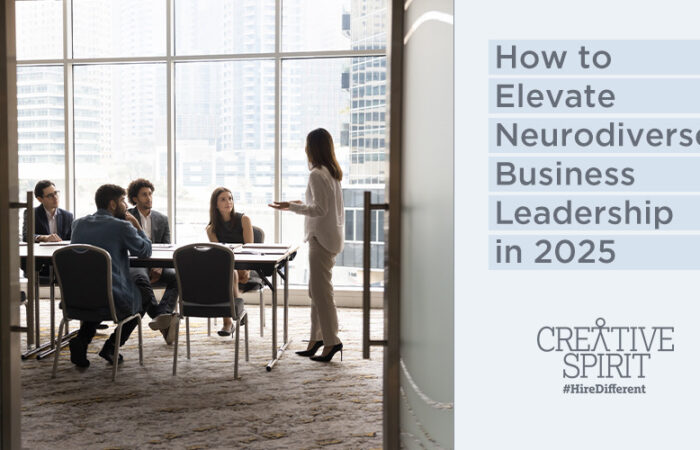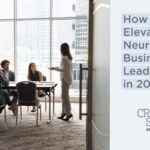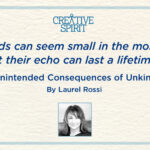By Menachem Raphun, Communications Manager, Creative Spirit
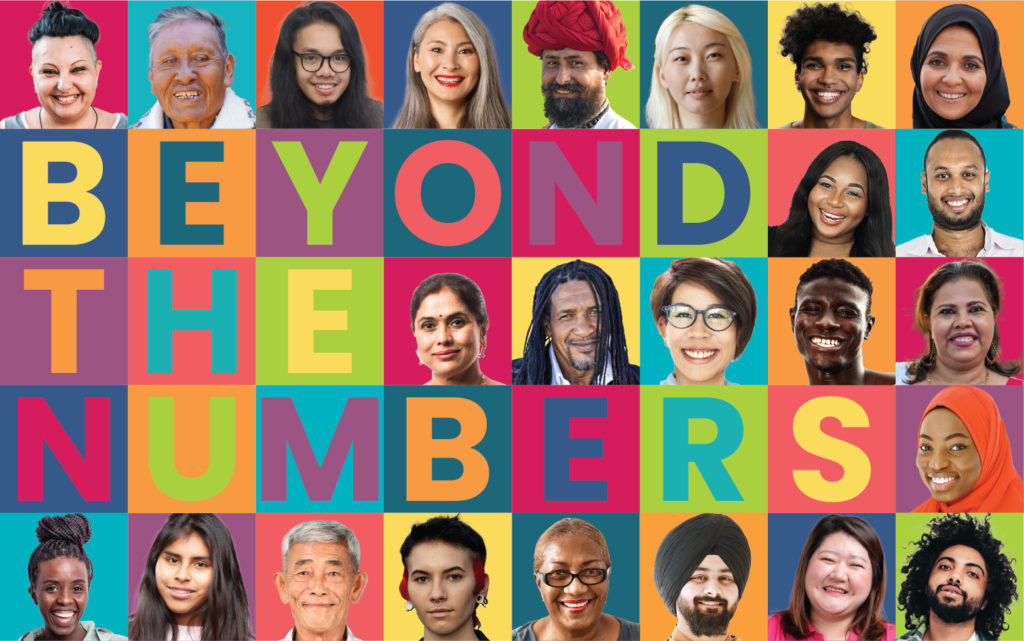
This year’s theme for BIPOC Mental Health Month is #BeyondTheNumbers, representing how the rich history and traditions of BIPOC communities transcend their numbers. This theme also explores the nuances and uniqueness of various BIPOC communities. It’s a theme that deeply resonates with us at Creative Spirit, and we have thoughtfully curated some of our own community stories that elevate BIPOC voices that we respect and admire, to continue to expand the dialogue between race and disability.
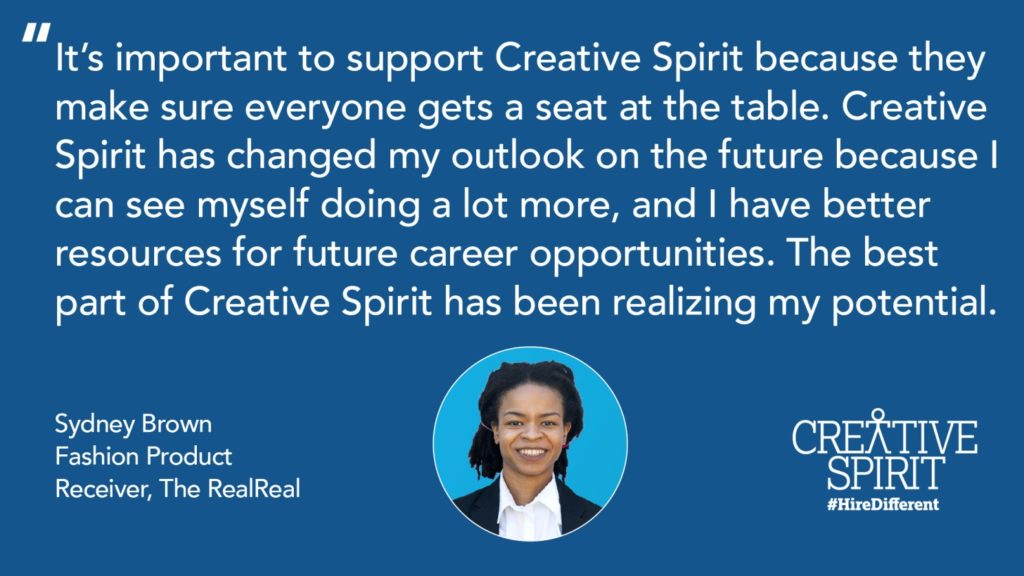
“Creative Spirit has changed my outlook on the future because I can see myself doing a lot more, and I have better resources for future career opportunities,” Sydney Brown, a former Creative Spirit candidate, said. “The best part of Creative Spirit has been realizing my potential.”
Roderick Sewell, the first bilateral above-the-knee amputee to finish the IRONMAN World Championship, also spoke with Creative Spirit as part of our 2021 #WhyICareSeries, sharing his perspective on inclusion as a person with a disability.
“I want to have the best life for myself, regardless of my disability,” Roderick said. “And I feel like anybody, regardless of their disability, deserves that same sense. So I’ve tried to be an advocate the best way I can.” Roderick also emphasized the importance of seeing the person before the disability. “I know the mindset of an individual who doesn’t have a disability, and how they look how they look at people with disabilities, and how there’s a lot of sympathies and just a lot of, “Oh, woe is you”. And I think that’s why there’s such a disconnect with having individuals with disabilities…in the workforce because you have to get to see them as people first. And I think that’s the one thing that a lot of people miss.”
Our goal is to generate discussion and connect even more candidates, including those who are members of the BIPOC community, with fair-wage employment. In an increasingly diverse and multicultural America, we acknowledge the specificity of individual and group experiences, and how that relates to their beliefs and well-being. All BIPOC communities are different, with unique needs, yet one commonality is that they are all significantly more likely to develop mental health conditions, according to Mental Health America. This is connected to the fact that BIPOC communities were especially hard hit by the COVID-19 pandemic, creating more stress and making the need for mental health care even more urgent. “Among BIPOC Americans with disabilities, 35 percent lost their jobs,” a report by National Disability Institute.org noted. “For some individuals, discrimination based on race and disability significantly affect[s] their lives in a myriad of ways.” At the same time, the report points out that “widespread recognition of historic and systemic racism has created a moment for deep reflection, in which we have a responsibility to increase our awareness of how BIPOC Americans with disabilities are even more impacted by systemic inequalities.”
Many disability rights advocates have pointed out that BIPOC communities often face intersecting forms of discrimination, such as ableism and discrimination based on race and gender. As ParachuteMedia.com explains, “BIPOC folks with disabilities are often excluded or silenced due to the institutional effects of both racism and ableism that prevail within society today.” As part of its toolkit for #BIPOCMentalHealthMonth, MHA has outlined a wide range of protective factors that can help individuals in BIPOC communities. For members of the African-American community, MHA suggests strengthening family and community bonds; expression through spirituality or art, and connection to Black identity; and emphasizing the importance of religion and spirituality. For Middle Eastern, Muslim, and South Asian communities, MHA recommends strong connections to faith, high use of Imams as mental health/spiritual counselors, and strengthening family bonds. MHA also offers practical advice for mental health professionals on supporting these communities. For Asian/Pacific communities, this includes incorporating community care practices into mental health treatment and using specific culturally responsive education to inform mental health care practices. For Arab, Middle Eastern, Muslim, and South Asian (AMEMSA) communities, MHA suggests applying faith-based and trauma-informed perspectives to mental health care and ensuring that data collection forms include AMEMSA categorization. For Indian/Alaska Native (AINA) communities, diverse recruitment of AINA volunteers and professionals can also make a difference in improving mental health programs.
Creative Spirit is dedicated not only to connecting our BIPOC candidates with employment but to addressing the systemic barriers facing members of BIPOC communities with disabilities. We’re achieving this by breaking down the stigma surrounding disability and partnering with organizations to help them recognize the creativity and innovation that people with disabilities, including #BIPOC individuals, can contribute. We also want to develop a sense of community among BIPOC individuals with disabilities. Speaking with Creative Spirit in 2021, Laura Mignott, Global Chief Experiential Officer at VMLY&R Commerce, described a meaningful experience she had connecting with other BIPOC professionals with dyslexia. “I kind of go back to this transformative thing where I spoke at this event, about being dyslexic, and how it was a struggle for me with work on certain things,” Laura said. “And the thing that came out of that conversation was that four women came up to me afterward and said, ‘You were the first black person we have ever met in our careers, who has dyslexia. We’re all dyslexic.’ And they were the first black people I met that were also dyslexic, because I kind of thought that in my, in this industry over the creative industry, I didn’t think there were a lot of folks who were like me.” Laura pointed out that many individuals with disabilities have left their jobs due to anxieties about disclosure, and that it doesn’t have to be that way. “We especially in the creative field, [the] marketing field, it’s all kinds of things that you can do,” she said. “And you know how that has made them stumble throughout their careers, and how they wish that they had seen more people who look like me, and them, earlier on, it would have given them…a pat on the back, like, ‘Look, this gets better, there are a million ways you can do this. And to embrace fully who they are, so they can kind of bring your whole self to work…if you have an IDD, tell people, if you feel comfortable doing that.”
Several other BIPOC Creative Spirit interviewees also shared meaningful insights into disability inclusion. “I think there’s never been a better time for employers to hire more folks with IDDs,” Angela D. Harrell, Senior VP at Voya Financial, said, commenting on the prevalence of remote work. “This is the time because this gives you a level of accessibility that you could never have had before.”
Roderick Sewell stressed the importance of self-esteem. “I’ve learned to appreciate my consciousness, my essence, and who I am versus how I look, what I’m dealing with,” he said. “And I think once you do that, you’ll start to appreciate a little bit more. And then individuals who are disabled will do more for themselves when it comes to getting what they want, or what they deserve.” Sanjeev Rao, a Creative Spirit board member and Chief Product Officer at Wunderkind, explained how having a daughter on the autism spectrum motivated him to get involved in disability advocacy.
“My daughter is 11 years old, a bit on the younger side, but as it applies to when they grow up, and as well as people who are of any age, any adult who has kind of lived this all their life, you know, I like most people don’t know too much about this,” Sanjeev said. “I grew up in India, and just like America, it had at least more of a social stigma. I felt that was wrong, I never participated in any of that. But I guess I didn’t speak up enough. So now I think it’s important to show that you care.”
Drawing on these wide-ranging voices and personal experiences truly represent the diversity within the BIPOC community. Conducting these interviews has given Creative Spirit insight into both the nuances of BIPOC communities and overlapping areas where change still needs to be achieved. For #BIPOCMentalHealthMonth, we’re extremely motivated to make a difference for the better. Pinerest.org has shared several ways to support and be an ally to BIPOC communities, including posting support for the cause on social media; volunteering at or donating to a nonprofit that helps individuals in BIPOC communities with mental health concerns, and researching and learning about some of the issues facing BIPOC communities. Visit us at https://www.creativespirit-us.org/ to learn more about how you can join us in the effort to make genuine inclusion and representation a reality.
Sources:
1. https://www.pinerest.org/newsroom/articles/be-an-ally-july-is-bipoc-mental-health-awareness-month/
2. https://www.mhanational.org/BIPOC-mental-health-month
3. https://www.creativespirit-us.org/why-i-care-with-angela-harrell/
4. https://www.creativespirit-us.org/why-i-care-with-laura-mignott/
5. https://www.theparachutemedia.com/identity/understanding-disability-bipoc-community

